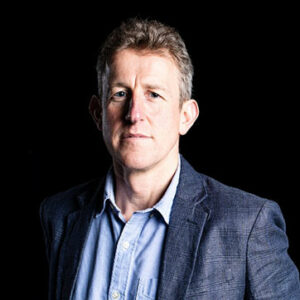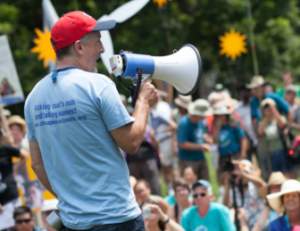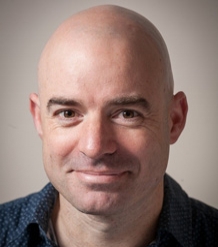Half of scientists polled think we are headed for a 3 degrees C hotter world within a single lifetime. From Exeter University UK, Professor Tim Lenton returns with the 2024 State of the Climate Report. His colleague at Exeter Dr. James Dyke fact-checks a popular climate myth about “overshoot”. With author and activist Mike Tidwell, we talk hurricanes, Appalachia, and coping.
Listen to or download this Radio Ecoshock show in CD Quality (57 MB) or Lo-Fi (14 MB)
PERILOUS TIMES ON PLANET EARTH
2024 REPORT – TIM LENTON
“Perilous times on Planet Earth” – that is the state of our climate right now in 2024. Who says so? A really impressive group led by Oregon’s William Ripple, and complete with climate science leaders like Johan Rockström, Michael Mann, Naomi Oreskes, Stefan Rahmstorf, and Thomas Crowther – all Radio Ecoshock guests.

Taking us through the latest report is another big name in the field, Dr. Timothy Lenton. He is founding Director of the Global Systems Institute at the University of Exeter, Chair in Climate Change and Earth System Science, and a highly cited scientist.
Listen to or download this 22 minute interview with Tim Lenton in CD Quality (57 MB) or Lo-Fi (14 MB)
The 2024 state of the climate report starts off with a series of gut punches. The first sentence is: “We are on the brink of an irreversible climate disaster.” The full title is: “The 2024 state of the climate report: Perilous times on planet Earth.” It is free and Open Access.
The United Nations process says 1.5 degrees C. warming over pre-industrial is the line we should not cross. According to this new report, a 2024 poll finds “...nearly 80% of these scientists anticipate global temperatures increasing by at least 2.5°C above preindustrial levels by the end of the century (Carrington 2024). Nearly half of them foresee a rise of at least 3°C. A mere 6% believe that the internationally agreed-on limit of 1.5°C will be achieved”.
Imagine the sacrifice required to rapidly slash our emissions, personally and as an economy. I suppose it is less than sacrificing lives in war, but only just. At the moment there is not much social or political will to do it. Is there a point where it is genuinely too late?
I’m old enough to remember Tim, Michael, Johan, Naomi, and Stefan before climate became controversial and political. Even Conservatives spoke of the need to address climate. Maggie Thatcher did. Then research scientists were called to be public speakers and media communicators. It is a lot to ask. A lot of scientists never wanted or expected it.
SEE ALSO: This helpful summary “Report: Earth is headed for an ‘irreversible climate disaster‘” By Rodielon Putol Earth.com staff writer.
Previous Ecoshock appearance for Tim Lenton:
Posted on March 20, 2024
When big systems flip into another state, that is trouble for species needing normal. Like us. We get the latest on global tipping points in 2023 from one of the world’s experts, Professor Tim Lenton from Exeter University.
Before that, Lenton appeared in 2020.
====================
CAN YOU HELP WITH STUDIO COSTS?

After 15 years, I need a new office chair – an ergonomic one. I was surprised how much a spine-supporting office chair costs these days. The desk is also way too small. I may build my own to suit, but even lumber and paint costs money. Plus I need new lighting to help me see. Etc. If you can chip in to help pay those costs, and the ongoing server costs involved in making Radio Ecoshock free to people around the world – please do! Here is a page where you can make a donation, or send a check.
Thanks for your help! – Alex
=====================
AFTER THE STORMS
CLIMATE ACTIVIST MIKE TIDWELL

Some people see the future more clearly. In 2012, I interviewed American author and activist Mike Tidwell about his book. The title might as well be today’s headlines: “The Ravaging Tide: Strange Weather, Future Katrinas, and the Coming Death of America’s Coastal Cities.” That is surely where we are now with double hurricanes and the future of coastal Florida in doubt. Mike Tidwell is the founder and director of the Chesapeake Climate Action Network. They work on global warming impacts and solutions in Maryland, Virginia, and Washington D.C and beyond.
Listen to or download this 16 minute interview with Mike Tidwell in CD Quality (57 MB) or Lo-Fi (14 MB)
Two weeks ago this was the situation: a friend lives on higher ground in Asheville, North Carolina. Their river view is displaced by rubble. There is no power, drinking water or sewage services and they are not coming back soon. Schools and all other services are closed. The couple had to quickly enroll two high school kids in a Christian school further north. My friend watched bodies being pulled out of tree tangles and toxic mud. This is really bad what happened inland, and so unexpected from a Gulf Hurricane.
MIKE’S NEW BOOK: HYPER-LOCAL CLIMATE CHANGE
Mike writes:
“I also have an interesting new book coming out in March from St. Martin’s Press. It’s an account of the significant impacts of climate change on my one city block on the border of Washington, DC. It’s titled ’The Lost Trees of Willow Avenue.’ Here is a link to the book’s promo page. Climate change has gotten so bad that you can write a whole book about the impacts on your own street like mine: dying trees, Lyme disease, extreme precipitation. No one has written such a hyper-local take on climate change like this before.”
My 2012 interview of Mike Tidwell about his prescient book “The Ravaging Tide” is here.
=====================
THE DANGEROUS MYTH OF “OVERSHOOT”
JAMES DYKE
After the mega-storms, wildfires, floods and killer heat around the world, this November all countries will meet in Baku, Azerbaijan to discuss what to do. They have a myth to sell you. The latest report from the Intergovernmental Panel on Climate Change offer a free pass: if humans push warming past the 1.5 degree C safety line that is OK. Future technology will bring carbon back down again, cooling the Earth. Do you believe that?

The best analysis from European scientists do not. The new paper in the journal Nature is called “Overconfidence in climate overshoot.” We reached Dr. James Dyke, Associate Professor in Earth System Science, at the University of Exeter. James is Assistant Director of the Global Systems Institute. He publishes widely in newspapers and online. Dyke’s latest book is “Fire Storm and Flood: the violence of climate change.”
Listen to or download this 18 minute interview with James Dyke in CD Quality (57 MB) or Lo-Fi (14 MB)
YOU CAN’T GO BACK
“Overshoot” in climate science refers to a theory advanced by the Intergovernmental Panel on Climate Change and part of the science behind COP agreements like the Paris Accord. According to this theory, humanity may heat the planet up beyond 1.5 degrees C. But then technology, like carbon capture or perhaps geoengineering, can bring global average temperatures back to the 1.5 degree point, over time.
They picture Earth’s atmosphere like a thermostat. If we make it too, hot, we just turn the temperature down and everything goes back to the way it was. I object.
Anyone who watches Nature knows once things change, they may never go back. When Atlantic Cod were fished almost to extinction, they did not return after fishing was stopped. Other life forms took over that ocean bottom habitat. Multiply this a million times for bacteria, plants, animals. How could anyone believe humans can just wind back living systems to what they want?
The latest climate map by Intergovernmental Panel on Climate Change AR6 process is not concrete about overshoot. They talk about going 0.1 degrees C over the safety limit, but it could be 0.3 C or more. In our May 2022 interview, James Dyke told us every 10th of a degree matters now. I think we should be nervous about how fuzzy this permission to fail has become in official channels.
Keep in mind: the IPCC talks about .1 to .3 degrees as though certain. But they are just “median outcomes”. The reality may be far worse – another way we officially underestimate overshoot risks.
See this article by Dyke and two other scientists in The Conversation: “The overshoot myth”.
The scientific paper raises several significant and weighty problems that might delay or reduce actualization of mass-scale carbon dioxide removal. They include things like political resistance and failed business models. But then they add “public opposition”. I ask James about this in our interview.
THE PAPER SAYS: “Time-lagged and irreversible impacts
For a range of climate impacts, there is no expectation of immediate reversibility after an overshoot.
This includes
- changes in the deep ocean,
- marine biogeochemistry and species abundance,
- land-based biomes,
- carbon stocks and crop yields, but also
- biodiversity on land.
An overshoot will also increase the probability of triggering potential Earth system tipping elements. Sea levels will continue to rise for centuries to millennia even if long-term temperatures decline.”
Alex says: this is Hell of a list for no expectation of reversibility any time soon. It is most of the biosphere from the deep ocean to land, including crops and all living species we know. AND THEN: WHAT ABOUT TIPPING ELEMENTS?
MORE SOURCES ON THIS PAPER (good easy explanations)
U OF EXETER ARTICLE
PREVIOUS JAMES DYKE ON RADIO ECOSHOCK
Posted on May 25, 2022
Climate Breakdown Is Here. Exeter scientist James Dyke on fighting rear-guard action to stave off the worst.
Based on this article in The Conversation with Julie Steinberger
“Climate breakdown: even if we miss the 1.5°C target we must still fight to prevent every single increment of warming” Published: May 11, 2022

CARBON DIOXIDE REMOVAL – CURRENTLY PART OF MYTHOLOGY
HOW MUCH ARE WE REMOVING NOW? WIKI SAYS
“As of 2023, CDR is estimated to remove around 2 gigatons of CO 2 per year. This is equivalent to about 4% of the greenhouse gases emitted per year by human activities.” (Source)
If we need “several hundred gigatonnes” CO2 removal – that would require carbon dioxide removal capacity at least 100 times greater than our current 2 gigatons a year, and probably more.
The World Economic Forum finds we need 5,000 times more CDR than currently exists:
“To reach net zero by 2050, up to 10 billion tonnes of CO2 must be removed from the atmosphere every year. CDR currently removes 2 billion metric tonnes of CO2 per year, of which 99.9% comes from nature-based CDR solutions such as afforestation or reforestation. Only 0.1% results from durable CDR. In other words, we need to scale durable CDR by a factor of 5,000 by mid-century.”
And do these numbers even include new science on the “collapse” of carbon sequestration by land plants? Likely not.
This new paper on over-confidence finds requirements for a 1,000-fold increase by 2050.
“Insufficient technological readiness may be an important bottleneck, as current removal rates from CDR methods other than afforestation and reforestation are minuscule (about 2 Mt CO2 yr) and would require a more than 1,000-fold increase by 2050.”
So everybody has a different number, but all agree the rapid increase in this technology would have to be so immense it is hard to imagine. Other sources suggest the carbon capture industry would have to become larger than the total global fossil fuel industry today – without a profitable product (other than survival as a species).
OVERSHOOT – SHOULD WE BELIEVE?
Just as a climate watcher, I distrust that convenient overshoot argument. I talk with too many scientists about trends that could push more warming and not a temperature plateau, much less cooling. Things like the “collapse” of carbon sequestration by land plants, permafrost, the disappearing ice-world and it’s solar reflection. Was it just convenient for the establishment – and fossil fuel addicts – to promise ourselves a Get Out of Jail Free Pass, like a Papal Dispensation for Sins sold in the Middle Ages.
A SHORT LIST OF DANGEROUS CLIMATE MYTHS
We try to inhabit scientific knowledge, a factual world, the realm of physics and energy. In truth, we inhabit myths. These myths came partly from our ancestors, who lived sustainably. Now they can be created for us by advertising, political campaigns or artificial intelligence. There is a long-list of climate myths and wishful thinking like:
- it’s OK to leave out world aircraft emissions because we can’t assign them to a country
- we are making progress in fighting climate change (no, we are making it worse)
- humans will solve the climate crisis with more technology
- fossil fuel corporations can measure their own emissions, we don’t need government monitors or aircraft sampling
- natural gas is a “clean” bridge to a better future
- don’t worry about the carbon costs of building “solutions” like solar panels or a new electric car fleet
- we always have ten years for real climate action before it is too late
- we don’t need to include tipping elements, because we don’t know when they will happen or how
- we can just go on living as before, just with some updated tech and minor sacrifices
AND NOW ADD: even if we overshoot the 1.5 goal by a bit, we are counting on going back.
SHOULD PLANNERS JUST ASSUME OVERSHOOT IS MYTH?
What does reliance on a faulty model of return from overshoot mean for adaptation? Should we include in any plans the soothing promise that humans will just cool down an overheating planet – and nature will go back to providing our needs? Or should planners or politicians, assuming there are some willing to act on climate – should they assume overshoot is a dangerous myth and plan accordingly?
This reminds me of a discussion with scientist Michael Prather. His team discovered methane would last longer in the atmosphere than current calculations. But that adds no warming to model estimates, because the scientists presumed the methane calculation was probably wrong, and went with observations instead. Maybe planners need to do the same with the overshoot and return mechanism. Just discount that and work with what is happening on the planet.
With science and observation, humans learned a lot about this planet’s operating system over the past fifty years. But now we face situations so new and complex, we can’t forecast. If we cannot confidently forecast the weather two weeks from now, we really do not know what the climate will look like in 2030, much less 2100. We just don’t know what is coming, or what the results of our techno-civilization will be.
==============
That’s it for this week. Take time to notice joy when it comes. I’m Alex. Thank you for listening, and caring about this world.